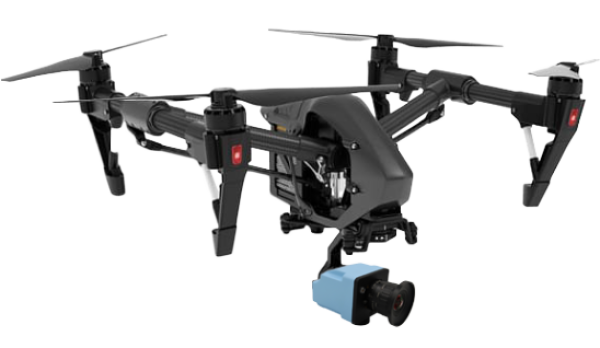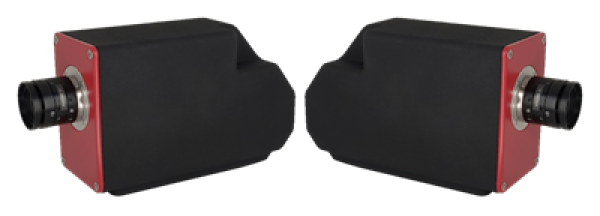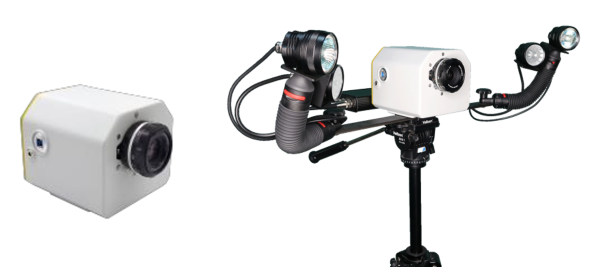
Hyperspectral camera VNIR 370-1000nm
- technology: electro-optical tunable filter
- 370 – 1000 nm
- spectral bands: 126/315; possibility of spectral maps
- spatial resolution: 6.4 MP
The EO filter automatically selects and tunes the imaging center wavelength. It is synchronized with the imaging sensor module so that several narrow band images are captured during a spectral scanning.
In the image domain, the data set includes a full image at each individual wavelength. In the spectroscopy domain, a fully resolved spectrum at each individual pixel is recorded. The nature of imagery data is typically multidimensional, spanning spatial and spectral dimensions (x, y, λ).
Shift in focus, due to chromatic aberrations are perfectly compensated with an embedded autofocusing system, so that all the collected hypercube images are sharply focused. The minimum nominal tuning step is 3 nm and scanning time ranges between 30s-50s, depending on scene’s illumination intensity/shutter speed.
Advantages of electro-optical tunable filter technology in hyperspectral cameras:
- full use of the spectral range of the CMOS (Si) or InGaAs sensor in UVA - VIS - NIR – SWIR (unlike Fabry-Perot filter technology, or certain push-broom technologies)
- use of lenses with C thread (C-mount) so as not to compromise neither the field of view nor the focusing distance (unlike hyperspectral imagers by F-P filter or interferometry + Fourier transform among other technologies)
- polarization independent, allowing a high filter light throughput. It transmits 94% of the incoming light at any given active spectral band, while, at the same time, rejecting all the out-of-band wavelengths with an incredible blocking efficiency exciding 4 OD (T=0.00001%).
- combines high spectral resolution with high spatial resolution. Each spectral cube contains 6.4 million spectra (6.4 MP sensor), with each spectrum being sampled with up to 126 (extendable to 315) points: 126/315 spectral bands
- user configurable as multispectral imaging system: for acquiring critical spectral bands dedicated to specific applications, for improving data handling efficiency and workflow
- can effectively accommodate both static and moving scenes
Click here to learn more about our electro-optical filter technology versus Fabry-Perot filter technology..
Additional advantages of the ISC-Muses9-HC hyperspectral camera:
- powerful camera control and spectral image and hypercube processing software at no extra cost
- optional spectral maps: represent with a color (fake, not real) all pixels of the same spectral class (similar spectral characteristics).
ISC-Muses9-HS Hyperspectral Imager Specifications:
|
|
ISC-Muses9-HS |
Notes |
|
Technology |
EO tunable filter |
NOT Fabry-Perot (F-P) based |
|
Wl range |
370-1000 |
Full frame |
|
Spectral bands |
126 / 315 |
|
|
Spectral maps |
Optional |
|
|
Spatial resolution/band |
6.4 MP (3096 x 2080 px, HxV) |
Binning options provided |
|
Light throughput |
94% (pol. Indep.) |
of the tunable filter |
|
Tunning step |
5-15 nm |
adjustable (configurable to 2nm) |
|
Spectral cube scanning time |
~30 s |
exposure limited |
|
Spectral image inspection |
Video rate spectral imaging |
at any selected wavelength |
|
Imaging modes |
Transmission, fluorescence, reflection |
|
|
Nr. spectra per spectral cube |
6.4 million |
|
|
Mechanical scanning |
Not required |
|
|
Camera thread - lens type |
C-mount |
Direct use with lenses, microscopes, telescopes |
|
Dynamic range |
12-bit |
|
|
Interface |
USB3.0 |
|
|
Calibration |
Automatic |
In all imaging modes |
|
Weight |
2100 g |
|
|
Control + processing software |
Incl. |
|
Here is a comparison of our various polyspectral cameras:
|
Technology |
EO filter |
EO filter |
Snapshot |
Snapshot |
|
Wl range |
370-1000 |
365-1700 |
370-1000 |
400-1000 |
|
Spectral bands |
126 / 315 |
6 (Si) + 6 (InGaAs) |
10 / 22 |
22 |
|
Spectral maps |
optional |
optional |
0 / 2 |
optional |
|
Spatial resolution/band |
6.4 MP |
6.4 + 0.3 MP |
6.4 MP |
6.4 MP |
|
Light throughput |
94% (pol. Indep.) |
94% (pol. Indep.) |
90% (pol. Indep.) |
96% (pol. Indep.) |
|
Thread - lens type |
C-mount |
F-mount |
C-mount |
C-mount |
|
Interface |
USB3.0 |
USB3.0 |
USB3.0 |
USB3.1 |
|
Weight |
2100 g |
1850 g |
480 g |
310 g |
|
Control + process sw |
Incl. |
Incl. |
Incl. |
Incl. |
|
Opt 1000-1700 nm |
handheld configurable |
(drone model) |
And their fields of action - preferred applications for multispectral-hyperspectral imagers:
|
nm |
370-1000 |
365-1700 |
370-1000 |
400-1000 |
400-1000 |
|
Drones / RPAS / UAVs |
|
|
|
|
x |
|
Handheld |
|
|
|
x |
|
|
In-line applications |
|
|
x |
|
|
|
Machine (artificial) vision |
|
|
x |
|
|
|
General lab use, R&D |
x |
x |
|
|
|
|
High sensitivity / low light |
x |
x |
x |
x |
x |
|
Forensics |
x |
x |
x |
|
|
|
Vegetation, agricultura (NDVI-VI) |
x |
|
|
x |
x |
|
Microscopy - fluorescence imaging |
x |
|
|
|
|
|
Solar photovoltaic - perovskite |
x |
|
|
|
|
|
Biology, biomedicine, pharma |
x |
x |
|
|
|
|
Mining, geology |
x |
|
|
|
x |
|
Recycling, sorting |
|
|
x |
|
|
|
Art |
x |
x |
|
x |
x |
(*) Configured as handheld
These multispectral and hyperspectral systems are not perfect, but they are among the best, and at PCL we are very pleased to be the distributors in Spain of the polyspectral technology expert Spectricon.
More information: ventas@procarelight.com / +34 605 024 420
Related products



